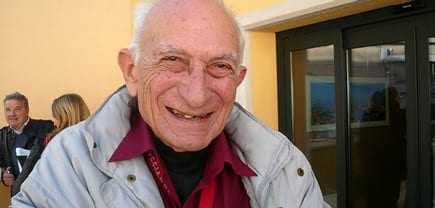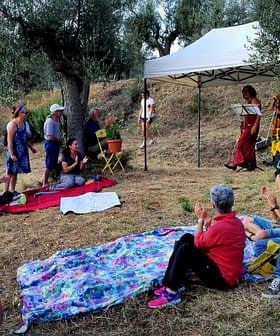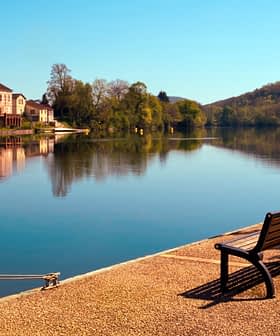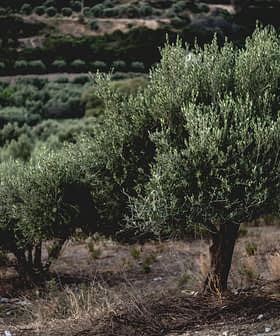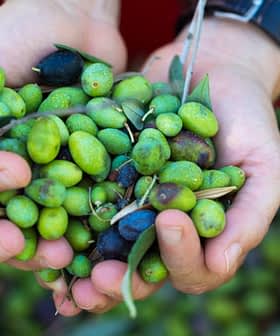Shimon Lavee, a plant scientist and renowned expert in olives, took part in the November 2011 Mediterranean Diet Forum. Lavee is Emeritus Professor of the Hebrew University of Jerusalem and associated with the Volcani Center for agriculture research, where he was once its deputy director. For the Mediterranean Diet Forum he was on the scientific committee, involved in a working group focusing on the environment and old varieties of olives, and signed the Re.C.O.Med treaty on behalf of the Israeli Plant Board.
Professor Lavee, his wife who is an important figure in theatre for youth, and Zohar Kerem, a colleague of Lavee’s were in Europe for the forum before travelling to Madrid for an International Olive Council (IOC) meeting. Prof. Lavee has been involved with the IOC, as the Israel delegate and as its President in 2000 and 2008.
The southern hemisphere is where Professor Lavee believes most of the world’s olive oil, at least the competitively priced olive oil, will come from in the long run. In Europe, he sees only Spain as being able to compete with Australia, South Africa, and the growing number of South American countries that are growing olives in hedgerows, using irrigation, and mechanized means. Lavee spends his time developing high-yielding olives meant for intensive culture, and he is something of a legend in his ability to select plants.
Zohar Kerem spoke of this uncanny ability to size up a tree just by looking at it. Lavee said that it wasn’t so much intuition as experience and that if you’re not good at it, you have to live with your mistake – a poor tree – forty years later.
Lavee also spends his time helping growers with plans for orchards, studying irrigation timing and harvest timing, advising graduate students, and attending conferences such as the Mediterranean Diet Forum.
Can you talk about olive oil in Israel? How much is produced and consumed?
Shimon Lavee: The production in Israel is now, in a good year, between 9 to 10 thousand liters of oil, and we consume somewhere around 17 thousand. Until now we used to import, in the last years about 50 percent. And in an off year, we produce only four thousand tons, of course the import was much larger. Now this year, quite a new number of orchards got into bearing, so it’s around, probably 10, next year maybe will be at 11,000, so the importing is getting down a little bit. But, it will take years that we’ll have to import. Three-quarters are traditional, with low yields. About 60 percent of the production today comes from about 25 percent of the area.
You’ve developed a new olive?
We have a number of them. The major olive, which has now been used all over the world, is called Barnea. That’s a big olive for shaker. We have a new variety which is for the hedgerow and that’s the Askal variety which apparently is going to, I believe, conquer half the world, because it is very adaptable both for an individual tree and for hedgerow and it has the oil content of 28 to 30 percent with a yield of 20 tons per hectare. It’s being planted all over Israel. I have signed agreements with Spain, with South Africa, with Australia, with South America, and with Italy we’re negotiating, they want to test it.
What should Italy be doing?
In Italy there is a problem because the plots are very small, historically – same as the traditional parts of Israel. A lot of the orchards are in mountainous areas. Now in those areas, the best intensification you can do is use a shaker. The hedgerow, that’s not for this kind of thing. That’s a problem. Italy will have to specialize in boutique oils, high priced oil for the special customers who are ready to pay for the name and so on. Justified or not, that’s not the point. But like some people are ready to pay 200 dollars for a bottle of wine because that’s the reputation and this I think is the direction which Italy will have to go. From the European countries, I think that in the long run the only one which will be able to compete, also on bulk, is Spain, because they have large areas, also of single ownership and also terrains where you can do full mechanization. I am sure in Italy there are some regions where you can also. What I know is the Florence region, around Perugia, and it’s not that easy.
Your colleague said that I should ask you about the Gethsemane olives.
That was one of the funniest things that ever happened to me. I got a call from the Public Relations Department of the Municipality of Jerusalem. They said ‘Look, from Gethsemane, they asked if they can have somebody who is an expert in olives. There is something wrong with a holy tree.’ I said, ‘Okay, next time I go to the Senate at the University in Jerusalem, I’ll come by.’ So I did, and there was a branch that was declining. This happens. So, I said ‘Okay,’ and I took a big garden shear and I cut off this branch up to a certain point, and they were shocked about it, [they said] ‘What will happen?’ I said, ‘Look, in about a year from now, from this place you’ll get a new branch.’ And, of course, this happened.
So I became the celebrity of the holy place there, and it was written in the newspaper of the Vatican that the Israeli scientist saved the holy olive, and I was personally so insulted. You know at that time, I published a study which I worked on five years and which I thought from the scientific point of view it was really a piece of work and, as usual, when you publish something like that you get ten, twenty requests for reprints, and for that stupid thing I was written up all over the world, in every newspaper.

